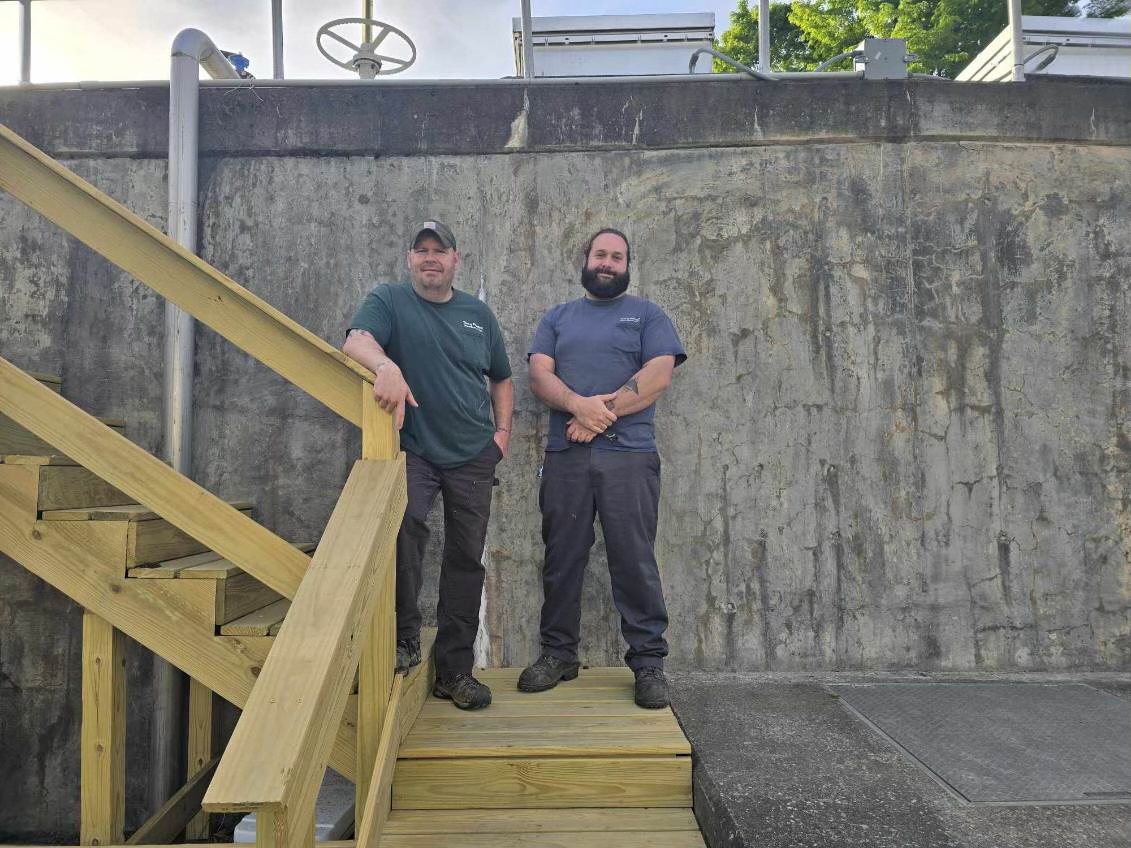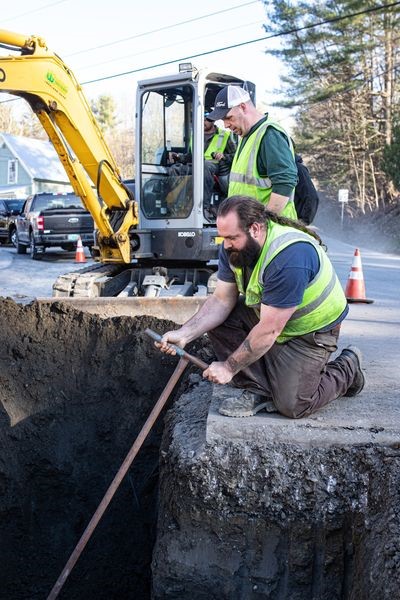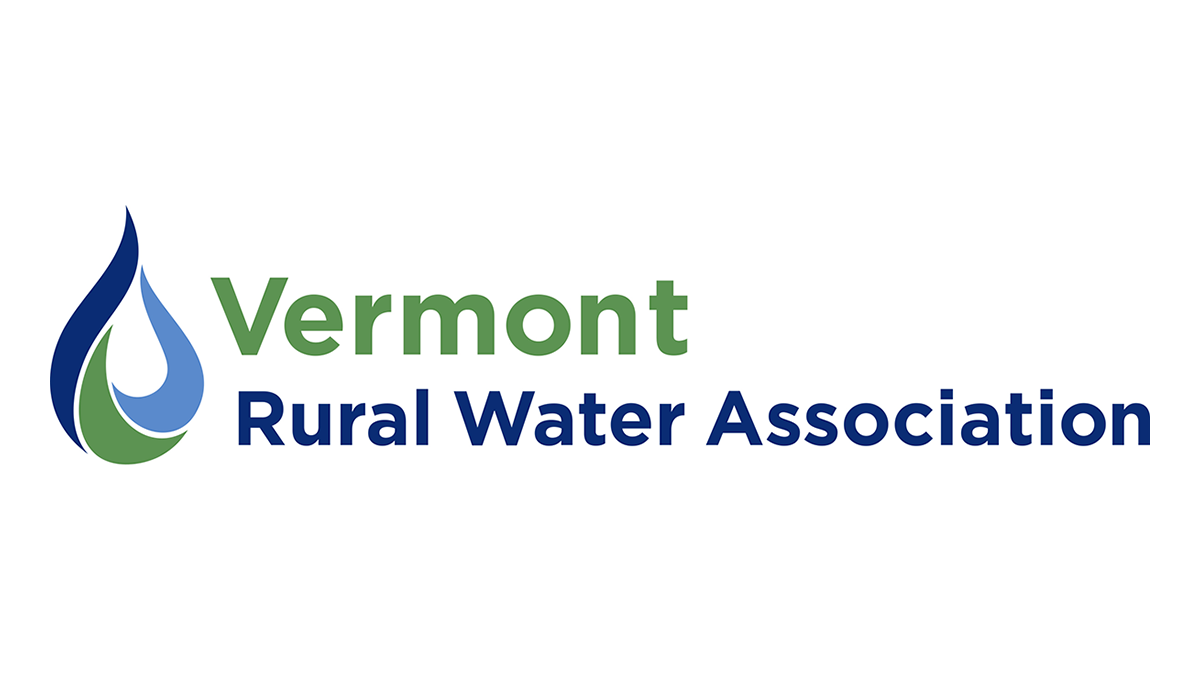
Scott Franks (left) and Tristan MacGregor-Stewart at the Plainfield wastewater treatment plant.
Names: Tristan MacGregor-Stewart (Chief Operator) and Scott Franks (Assistant Operator)
System: Town of Plainfield Water & Wastewater
About the System
When Tristan MacGregor-Stewart became the chief operator the Town of Plainfield water and wastewater departments, he decided it was time for some improvements. Tristan worked closely with the Water & Wastewater Commission to get their financial approval and support. Then Tristan and assistant chief operator Scott Franks got to work!
On the water side, the Maple Hill reservoir building was completely rehabbed with new roof, security improvements, and a paint job. The Hood wells building also got a new roof, structural repairs, and a paint job. Work was done to improve the water sources including refurbishing one of the springs with new well tiles and piping as well as installing another spring. Flow meters were added to all springs and plumbing was replaced where needed. The driveway to the springs was improved and trees were removed to allow better access and to protect the infrastructure.
The wastewater facility also got a lot of attention. To avoid disruptions and improve efficiency, they did many electrical upgrades, replaced two aging and critical VFDs, updated the ultraviolet disinfection system electronics, and replaced the effluent flow meter transducer. LED lighting was added to the control building and a new heat pump system was installed for heating/cooling. An aging SBR decanter arm was rebuilt.
Structural improvements included: UV room exterior wall replaced with new windows, concrete resurfacing of sludge holding tanks and new hatches, a new set of stairs installed to provide better access to sludge holding tanks, the area around the plant was landscaped to allow for upkeep and better drainage (this required removing 40 years of tree growth that was damaging infrastructure and fencing), fencing was replaced, and a new gate added for better access.
This was a lot of work for a two-person crew, but with the Water & Wastewater Commissioners’ support this small system was able to become much more sustainable. The Commissioners realized that water and wastewater operators perform very specialized job functions, are on call 24/7/365, and work in a very dangerous field. As a result, the Commissioners have done their best to ensure the operators are paid appropriately, are able to improve workflow and efficiencies, and improve or replace infrastructure as needed within a small town budget. In the long-term, the Town of Plainfield’s work and investments will save money and reduce hassle for the operators and the users of the system.

Tristan MacGregor-Stewart (front) and Scott Franks fixing a water main break.
What is a typical day like for you?
The first few hours of every day are spent doing routine monitoring of the water system and lab sampling for the wastewater system for flow, pH, settleable solids, and orthophosphate, as well as paperwork and prepping samples to be sent to an outside lab as needed. The second part of the day changes depending on weather and priorities. We could be found doing anything from putting a new roof on the reservoir to swapping UV bulbs and sleeves, or changing blower oil to reading water meters.
How did you get started in the water resources industry?
Tristan: My father worked for over 30 years for the state as a hydrogeologist. When he mentioned a water/wastewater job had opened up in Plainfield, I applied.
Scott: I saw a posting for a municipal job in my hometown and decided to apply.
What is your favorite part of the job? Least favorite?
Favorite thing would be the flexibility and variety of different tasks that ensure the days are never boring.
The least favorite would either be paperwork or emptying the barrels from under the mechanical screen.
What are you proud of?
We have spent a lot of time working to build efficiencies and organization into our day-to-day structures so we are able to best handle any sort of project that comes our way, expected or otherwise.
What is something you feel your system could improve?
As with many water and wastewater systems around the state, we often find that we are a little behind the curve on certain things, particularly technology. Considering how quickly technology and equipment are moving forward we are trying to make sure to bring processes and equipment up-to-date in order to have robust, resilient, and adaptable systems that will serve now and in the future.
Do you have any advice for other water/wastewater operators in Vermont?
Vermont is made up of a lot of small towns—don’t be afraid to do things that are beneficial even if they are a little outside of your exact job description. Keeping your work areas clean and organized is a huge asset.
What are your hobbies outside of work?
Tristan: I enjoy curling, a bit of wood working, and spending time with family.
Scott: Foraging in the woods, hunting, hanging out with the kids and the dog.
This can be a hard job that gets little thanks. What keeps you going?
Caffeine and a paycheck, haha. This really is a great industry to work in. There is always a need for what we do and there are a lot of other great, hard-working people to learn from and talk to. Especially in a small town, every day is different and there is more to learn and do.
Thank you, Tristan and Scott, and to all of Vermont’s water and wastewater heroes who perform essential services to protect the health and environment of our communities!
Do you know a Water Hero who should be featured here? Email info@vtruralwater.org

